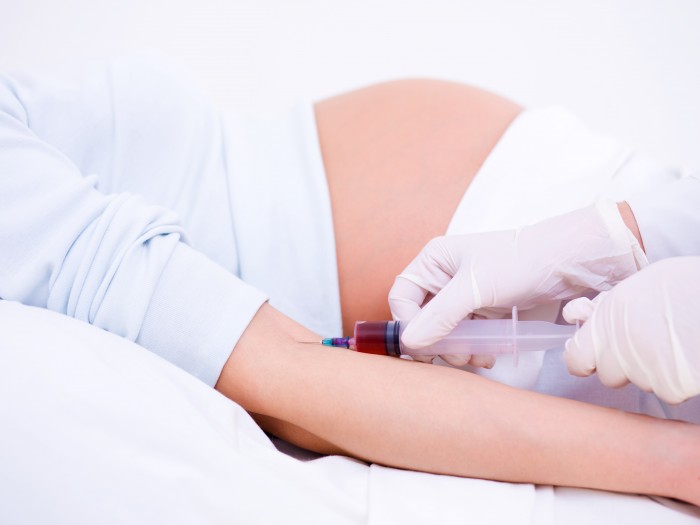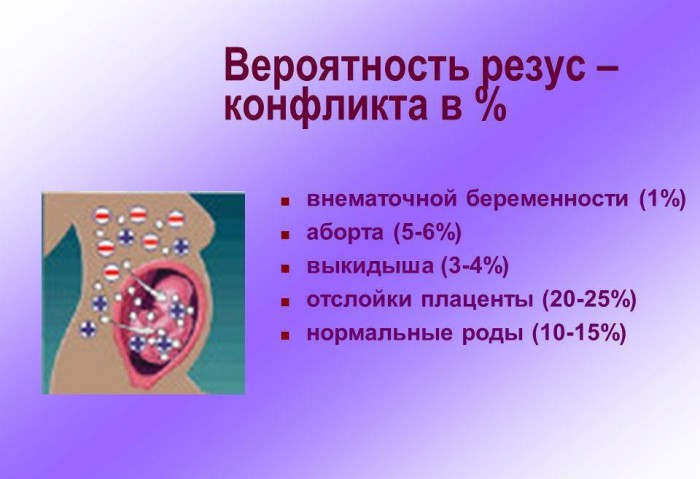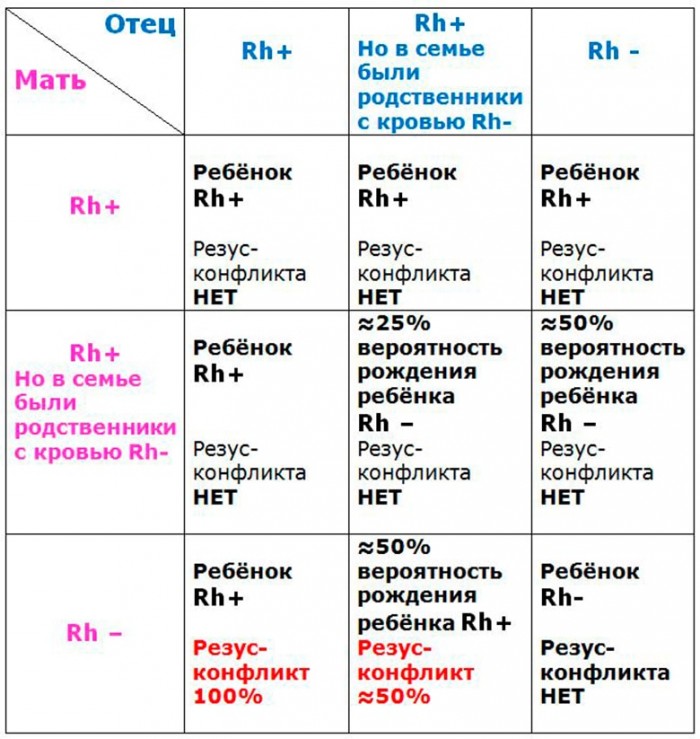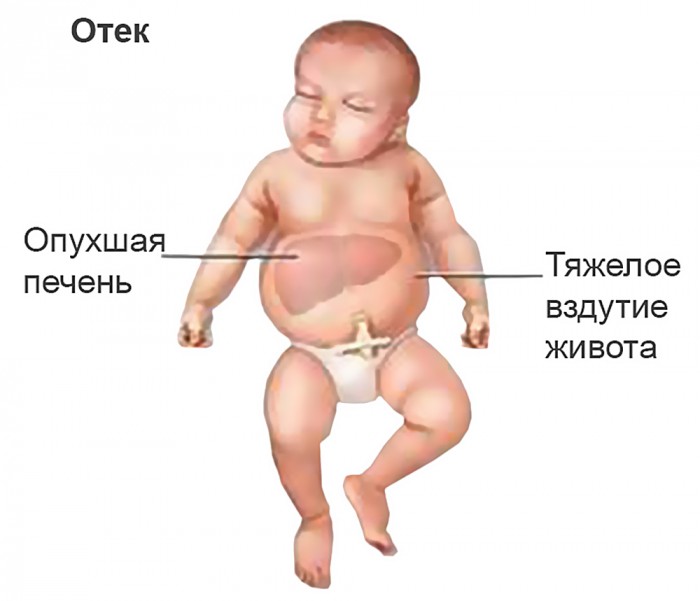
The rhesus factor is a substance located on red blood cells. He is named after the monkey, which was first discovered by this protein. The predominant part of the population is positive, and only 15% is missing this antigen.
Often you do not have to think about the presence of a rash factor, because he does not exhibit himself, and its absence or presence does not affect health. However, pregnancy makes thinking about many things, and the possibility of the appearance of a conflict reserves is not an exception.
The content of the article
- How is the reserves factor determined?
- Blood Analysis on Rh Factor
- Conflict
- Blood Group Compatibility Tables and Rh
- Symptoms of rhesv conflict
- What do antibodies mean?
- Resh conflict with first pregnancy
- Rhow-conflict with second and subsequent pregnancies
- Consequences of rezv conflict for a child and women
- Treatment of rhesv conflict
- Prevention of rhesv conflict
- Video: Resh conflict
How is the reserves factor determined?
- The presence of the Rh factor is determined by blood test. Determine the blood group and the presence of antigens, although there is no dependence between them. Rh-factor, like a blood type, constant concept, it does not change throughout life and is due to genetically
- There is no meaning if this protein is in the blood, with the exception, for example, situations requiring blood transfusion, operational intervention or pregnancy
- Women with positive rezes may not be afraid of the emergence of the conflict with a child, which cannot be said about the owners of a negative resume, which is noted as Rh
- Therefore, analysis on a blood group and rhesus takes one of the first when registered with the female advice on pregnancy or at the stage of its planning. Then analyze the likelihood of the development of rhesv conflict

Definition of the Rh
Blood Analysis on Rh Factor
Before passing an analysis to the Rh Factor, follow the recommendations in order to avoid errors:
- On the eve of the analysis, exclude sharp and fatty dishes from your menu
- Turning the blood should be on an empty stomach, allowed to drink simple water
- Purchase blood in the morning. So much easier to transfer hunger, besides, the result will be more accurate
- Do not forget to warn your doctor about the admission of drug drugs, if any
- Do not drink alcohol before analysis, do not smoke
- Immediately before the blood fence, relax, restore your breath, try to avoid emotional and physical exertion

Blood Analysis on Rh Factor
Conflict
The occurrence of rhesus conflict is possible only in the absence of a Mother of the Rh-factor (RH-) in case the fruit is a rezes-positive, which is inherited from the father of the child. The main cause of the rhesus conflict is the penetration of reserves-positive erythrocytes of the fetus in the blood of a pregnant woman. However, with first pregnancy, there are a number of reasons that can provoke it:
- Blood transfusion
- Previous pregnancy interruptions
- Prenatal invasive procedures
- Bleeding
- Plotching placenta
- Heavy gods
- Anemia
- Entry syndrome

Causes of Rezv conflict
Blood Group Compatibility Tables and Rh
As mentioned above, the rezv conflict may arise from a rhesus-negative mother and a rhesus-positive fetus, and the rear-to-belly child always inherits the father from his father, I invite you to get acquainted with the Mother's Compatibility Tables for Blood Compatibility Tables and Rh Factors:
Blood Group Compatibility Table
| Group | 0 (i) | A (II) | B (III) | AB (IV) |
| 0 (i) | + | + | + | + |
| A (II) | — | + | — | + |
| B (III) | — | — | + | + |
| AB (IV) | — | — | — | + |
Table compatibility on the Rh Factor and the probability of rhesv conflict

Important: With any compatibility, the birth of a healthy child is possible with careful medical supervision and qualified support for pregnancy.
Symptoms of rhesv conflict
The rhesus conflict does not appear externally. Only in some cases, its symptoms can resemble guests.
It is possible to determine the development of the reserves-conflict as of the fetus:
- Hemolytic disease
- Anemia
- Defeat or an increase in internal organs
- Poor blood building
- Even
- Justice
- Multi-way
- Accumulation of liquid in the abdominal or chest cavity
Important: The appearance of a rhesus conflict and its degree of gravity can uniquely identify only blood test for the presence of antibodies to RH.

Symptoms of rhesv conflict
What do antibodies mean?
- Antibodies are needed by the body to prevent sticking (agglutination) reserves-positive and rhesus-negative erythrocytes. Even at the initial stage of pregnancy, in the presence of the future mother and the father of the rhesus-negative blood, the anti-anti-antibodies are taken for antibodies
- In case of detection of any antibody titer (IGM and IGG), pregnancy is observed as a rhesus conflict. Each month is analyzed for antibodies to 32 weeks, then until the end of pregnancy - every 2 weeks
- From the growth rate of the concentration of antibodies in the blood of the mother depends on the pregnancy of pregnancy during the rhesv conflict. In the early detection of anti-antibodies, the risk of abortion and negative impact on the fruit is increasing, right up to the development of severe hemolytic disease
Resh conflict with first pregnancy
- A rhesus-negative mother and a rhesus-positive father almost with an equal share of probability can be both a reserves-positive and a rhesus-negative child. In the first case, since the 8th - 9th weeks of the erythrocyte of the fetus can get into the mother's body, causing iso immunization (or sensitization)
- The mother's body perceives the rhesus-positive red blood cells as hostile, and begins to attack them, is insulating like infection. In this case, we are talking about the rhesus conflict of mother and child
- In the event of a rhesus conflict during the first pregnancy, he does not submit a large risk due to the fact that the mother's body only began to produce antibodies against the child (IGM). The probability of extractive antigens across the placenta is extremely small due to their small concentration and large sizes.
Important: The emergence of the rhesus conflict during the first pregnancy threatens complications with the subsequent, since the likelihood of mother sensitization during childbirth is quite large.

Resh conflict during pregnancy
Rhow-conflict with second and subsequent pregnancies
In the course of subsequent pregnancies, the body already at a meeting with rhesus-positive red blood cells produces antibodies (IgG), which in view of their small sizes and quite large concentrations in the mother's body fall through a placental barrier and begin to destroy the erythrocytes of the fetus, which leads to a rather unscluded result.
Consequences of rezv conflict for a child and women
The rhesus conflict can lead to blocking the blood formation of the fetus and other, no less serious, consequences:
For the fetus:
- Hemolytic disease
- Increased liver, kidneys and other internal organs
- Defeat nervous system
- Intrauterine infection
- Future fruit
- Stinking
Treatment of rhesv conflict
- Desensitizing therapy - treatment course, which includes iron, vitamins, antihistamines. Held in the middle of the first, second and third trimesters. It serves to reduce the likelihood of the appearance of reserves-conflict in a rhesus-negative pregnant
- Plasmapheresis - plasma cleansing in the second half of pregnancy. It is carried out by picking blood in a pregnant woman, separating it in a centrifuge and introducing back to the body. Ultimately, erythrocytes with plasma-replacing drugs fall into the body of pregnant
- With the defeat of the fetus, due to the reserves-conflict, the newborn is doing blood transfusion, breastfeeding is prohibited. It is possible to feed the baby with breasts only with a satisfactory condition of the baby and in the case of the injection of the mother of the antuxustic immunoglobulin

Breastfeeding with rhesus conflict
Prevention of rhesv conflict
On prevention of Rh-conflict and the possibility of its occurrence should think at the stage of planning of the child.
- In the first place, along with the future father hand over analyzes on Rh-affiliation
- Provide information about blood transfusions, abortion, miscarriage, or the presence of other factors that can trigger the development of Rh-conflict
- To determine the likelihood of Rh-conflict pass ultrasound regularly for 20-35 weeks of pregnancy
- Injection of Rh globulin is used for any form of abortion, at the end of the second - early third trimesters to avoid negative consequences for the fetus. After delivery, the injection is administered repeatedly for 2-3 days to avoid conflict Rh in subsequent pregnancies
- Prevention of Rh conflict during pregnancy is carried out in the absence of antibodies in Rh-negative mother since the late second trimester, to avoid complications during delivery
- Injection of prevention is introduced regardless of the outcome of pregnancy, including all kinds of interruptions. After delivery, repeat injection to reduce the risk in subsequent pregnancies
